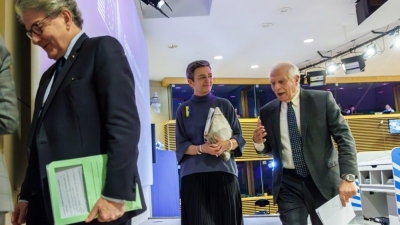Poland struggles to accelerate efforts for a rare disease plan

Poland adopted a National Rare Diseases Plan in 2021 – by December 2023, it had lapsed. New efforts are being made to push forward a sustainable plan, but an exact date for resuming the Polish Rare Diseases Plan remains undisclosed by the Polish government.
“The Rare Diseases Plan will be adopted by the Council of Ministers in the second quarter of this year,” assured Minister of Health Izabela Leszczyna during a conference held on the occasion of Rare Disease Day, organised by the National Orphan Forum.
“I will not promise more than I can deliver, but I pledge to dedicate all my energy and everything possible to ensure that patients with rare diseases receive the best possible care,” she added.
Are rare diseases really rare?
Following the European Union’s criteria, a condition is deemed rare in Poland if it impacts no more than five per 10,000 individuals. It’s estimated that approximately three million people are affected by rare diseases in Poland, while across Europe, the figure rises to 30 million, and globally, it reaches 300 million.
These statistics underscore that rare diseases are anything but uncommon when viewed collectively, and their impact extends far beyond the individual, affecting a much broader demographic.
In addition to the patients, their families and caregivers are often drawn into the circle of care, as these conditions commonly entail severe physical or intellectual disabilities. As a result, the ripple effects are felt throughout the entire social network of those affected.
The Council of the European Union urged member states to create a National Plan for Rare Diseases as early as 2009, aiming to establish a comprehensive care model for affected patients, with a deadline set for completion by the end of 2013. Polish efforts in this regard have been sluggish, but there are hopes for an acceleration in progress.
“The program will not merely remain on paper. The resources for its implementation have been secured,” stated Deputy Minister of Health Ursula Demkow.
As a first step, a patient information platform, a registry of Polish patients with rare diseases and Rare Disease Expert Centres are to be established.
“This is very good news otherwise we would have lost the enormous amount of work that experts have put into the document and the work of preparing its implementation over the past years,” Agnieszka Grzybowska-Zalewska, CEO of The Employers’ Union of Innovative Pharmaceutical Companies INFARMA told Euractiv.
Difficulties accessing treatment
As data from the Polish Refund Radar shows, only 41 innovative drug technologies out of 134 registered in the area of non-oncological rare diseases and 38 innovative drug technologies out of 98 therapies in the area of oncological rare diseases available in the EU are currently reimbursed in Poland.
While, since 2020, Poland has seen some increase in the number of reimbursed orphan drugs, there is still a huge unmet need in the area of rare diseases.
“We have been talking for a long time about the need to gradually close the gaps in access to modern treatment. Maintaining this positive trend, and preferably intensifying efforts, is a necessity if Polish patients are to be treated by the latest medical knowledge and European standards,” Michał Byliniak, Director-General of The Employers’ Union of Innovative Pharmaceutical Companies INFARMA, said to Euractiv.
INFARMA experts explained in their recent statement that the development of a new drug takes an average of 12-15 years, costs around PLN 8.6 billion (more than € 1,9 billion) and is subject to a high risk of failure.
According to INFARMA: “Every year, the pharmaceutical industry invests more than PLN 200 billion [€ 46 billion] in European research and development.”
With this in mind, they argue it is imperative to expedite research development and ensure equitable patient access to new medications. “With approximately 8,000 innovative therapies currently in development, it is crucial to make them more widely and rapidly accessible to individuals with rare diseases,” INFARMA emphasised.
Nathalie Moll, Director General of the European Federation of Pharmaceutical Industries and Associations (EFPIA), believes that the regulations within the pharma package could pose potential challenges in this area.
This is also indicated by research commissioned by EFPIA, which estimates that proposed revisions to orphan medicine incentives could impede the development of 45 products by 2035, potentially leaving 1.5 million European rare disease patients without new treatment options and reducing research spending by €4.5 billion.
[By Paulina Mazolewska, Edited by Vasiliki Angouridi, Brian Maguire | Euractiv’s Advocacy Lab]
Read more with Euractiv




